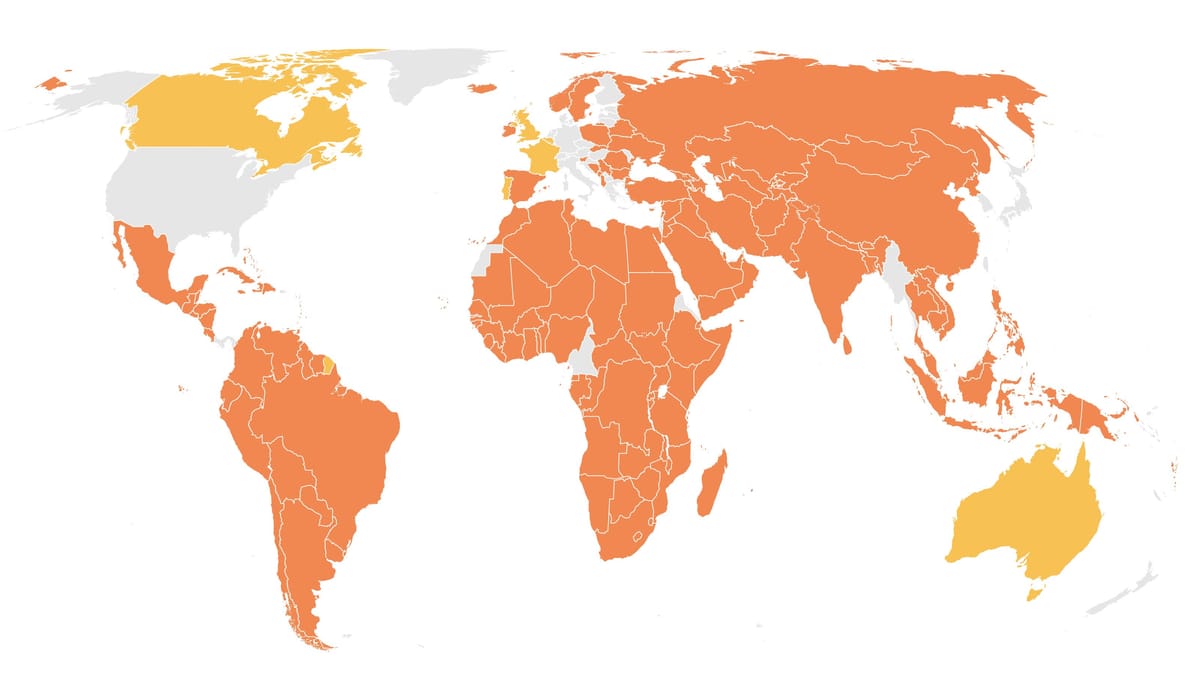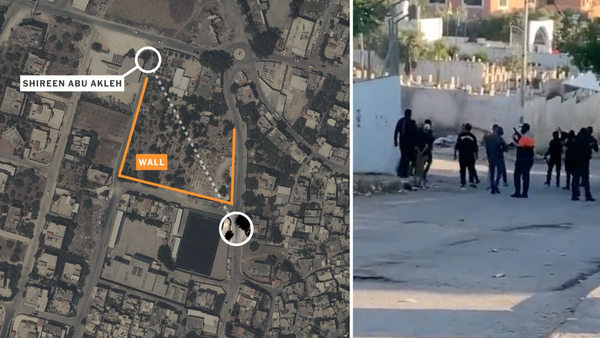How to recognize Palestine and still not get what (you say) you want

Plus, major new surveys of Syrian public opinion and German academics.
Britain, France, Canada and Portugal have now officially recognized the State of Palestine, in one of the first really major political consequences of Israel's horrific war on Gaza. At one level, this is a major symbolic moment, a long overdue recognition of Palestinian national rights by core Western powers including two permanent members of the Security Council. It represents a significant political setback for Israel, though one that will largely be shrugged off by a country locked into political place by Netanyahu and an extreme right wing coalition and whose broader national understanding of Gaza deeply and fundamentally diverges from how pretty much everyone else in the world understands it. It shows how isolated and outside international consensus the United States and other holdouts have now become. And it offers some opportunities for international and Palestinian diplomacy.
But recognition of a Palestinian state means little if it isn't accompanied by concrete actions to change Israel's behavior and to meaningfully push towards making that state a reality. Israel is on the verge of completely obliterating all that remains in Gaza, destroying Gaza City and expelling or decimating the Palestinians who have survived two years of bombardment, starvation, and displacement. It still shows little interest in even the fantastical "day after" plans being developed for Gaza, other than talks of resettling following its ethnic cleansing and building resorts on the graveyards. Israel is escalating its seizure of land in the West Bank and openly discussing plans for annexation, with the evident approval of at least parts of the distracted and dysfunctional Trump administration. It has been a long time since there has been any serious prospect for a two state solution; the recognition of the state of Palestine by these four Western powers comes at a time when the possibility of such a state actually existing has never been lower. And it does not yet seem to include any meaningful material implications such as an end to arms sales, sanctions, or any other coercive mechanism. In other words, it looks more like a way to appear to be doing something while avoiding actually doing anything.
Shibley Telhami and I wrote about this dynamic in depth for Foreign Affairs in July, outlining both its positives and its negatives:
With all this in mind, the push for recognition of a Palestinian state should not be dismissed. If a large new wave of countries jointly recognize a state of Palestine, it would serve as a powerful symbol of growing international frustration with Israel’s obliteration of Gaza and apartheid-like domination of the West Bank. Much of the world would welcome an alternative to the seemingly inexorable drive toward annihilation and annexation. Recognition would also help anchor the debate about the Israeli-Palestinian conflict in international law and could save Gaza from the full-scale destruction and depopulation threatened by some Israeli government ministers. And it would give the Trump administration leverage that it can use to push for the kind of grand bargain he hopes to broker.
But recognition of de jure Palestinian sovereignty in the absence of real change on the ground would be a trap. Recognition cannot be an end unto itself. If many countries choose to recognize Palestine but fail to confront the reality of escalating Israeli domination of the occupied territories, recognition could prove seriously counterproductive. If formal recognition becomes a substitute for defending the primacy of international law and addressing the core realities of Palestinian suffering, it would be at best a hollow gesture—and at worst an epic misallocation of scarce international political capital.
Little has changed about both the potential positives and negatives, other than the Trump team coming down firmly on the wrong side of the issue (as it does on virtually every issue). Right now it very much looks like recognition is heading down the wrong path towards meaningless symbolic action as a way to avoid taking concrete measures to protect Palestinians in Gaza and the West Bank or to rein in an ever more aggressively expansionist Israel. Still, the very fact that some of America's closest allies were willing to take this step – Britain's hard on the heels of Trump's embarrassing state visit – shows both how Israel's determination to continue its destruction of Gaza despite everything and how Trump's determined antagonizing of the entire world are beginning to take their toll.
It is expensive to host my blog here; if you can, please consider becoming a paid member to help me keep the MENA Academy running:
Several interesting surveys on issues of interest to the MENA Academy were released late last week, one on Syrian public opinion and the other on Middle East Studies in Germany.
The Arab Center released the results of a major new survey of Syrian public opinion. The survey, part of the 2025 Arab Opinion Index, included more than 3500 respondents and asked a broad range of questions about both immediate political issues and deeper social and economic issues. The survey found a "widespread sense of optimism", with 56% saying the country is going in the right direction and only 25% say it's going in the wrong direction. Roughly 80% of Syrians expressed happiness with the fall of the Asad regime, though many also expressed fear and uncertainty. Nearly 60% said that the political and security situation were generally good, a view held by nearly nobody about the catastrophic economy.
There's so many interesting findings in the survey, but let me highlight a few that jumped out at me. 65% want transitional justice and accountability to apply to anyone who took part in war crimes, with only 25% saying that only former regime officials should be held accountable; that's really fascinating, a huge challenge to the new government, and something which likely holds something like a skeleton key to other evaluations of the government's legitimacy and performance. While 17% support normalization with Israel (which is actually one of the highest rates in any Arab country surveyed), 88% of respondents said that Israel threatens stability in Syria, with only 4% saying that it did not. Despite some Syrian delight with Israeli attacks on Hezbollah and Iran, Israeli interventions in the south of Syria are not winning it any friends (neither is Gaza, to which 74% of respondents say they pay attention). 78% say that social media has become a "hotbed for sectarian rhetoric", "a source of fake news", and is "breeding incitement against others." There's so much more – I'd encourage you to check out the full survey results for more.
Second, a major new study of German academia since October 7 has just been released in English. Modeled in part after the Middle East Scholars Barometer surveys which Telhami and I have fielded the last few years, this new project administered by a team of German scholars (Jannis Grimm, Sven Chojnacki, Nina Moya Schreieder, Iman El-Ghoubashy, and Thaddäa Sixta) finds similar themes of scholars facing extreme pressures from government, their institutions, external advocacy groups, and the media. The survey documented patterns similar to what we found in the US: 85% say that the threat to academic freedom has increased since October 7. 76% say that they self-censor when discussing issues related to the Israel and Palestine, with over 60% saying it is because of fear of media, political, or professional consequences (only 25% say it is because of student concerns). Again, this is a rich survey which probes deeply into the experiences and perceptions of German academics – very much worth exploring.



